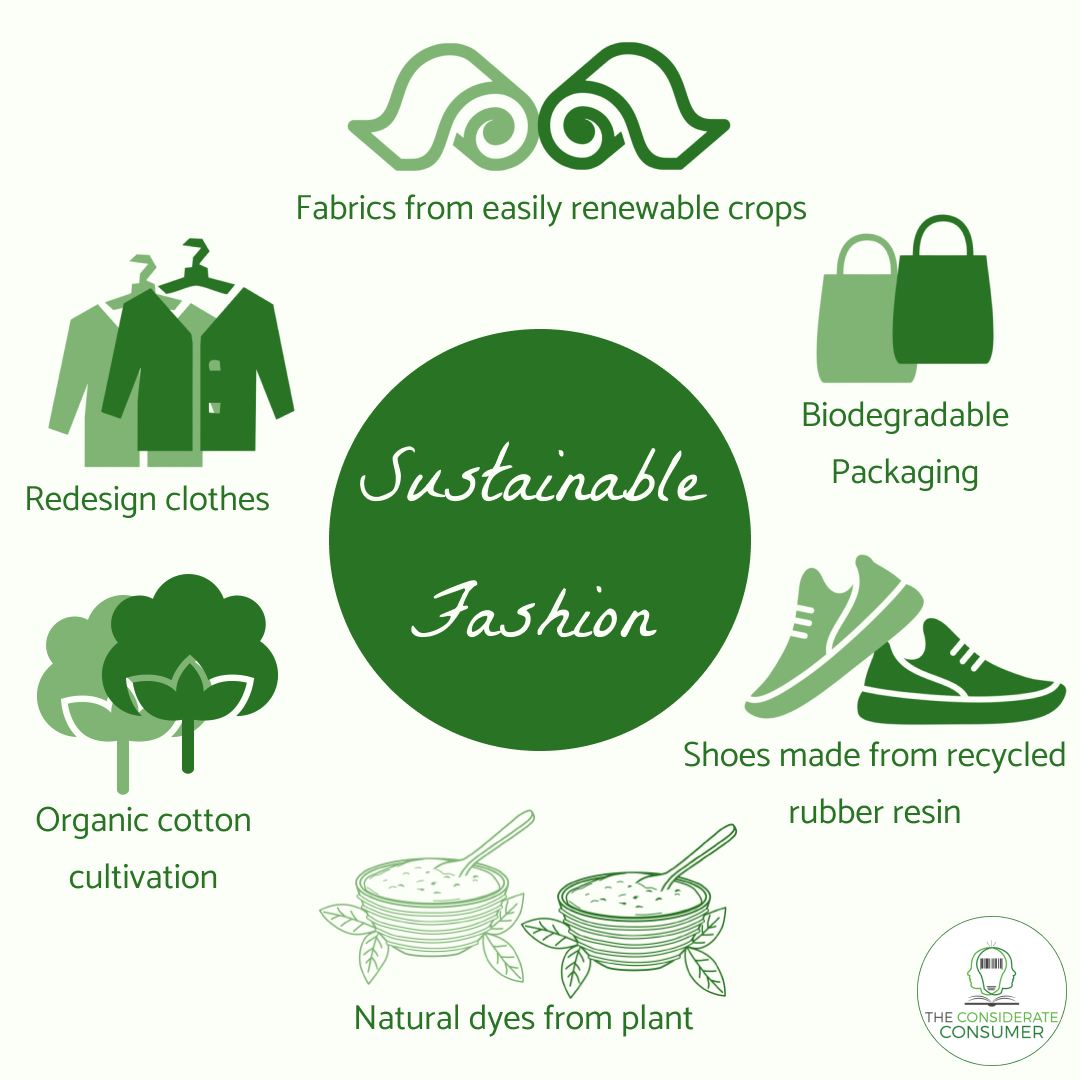As the population continues to expand, fast fashion has emerged as a dominant force in setting new trends. People increasingly embrace fast fashion for its blend of elegance and style. However, this rapid growth in the fast fashion industry has led to a concerning environmental crisis. A significant portion, over 60 percent, of fabric fibers now consists of synthetic materials derived from fossil fuels. Consequently, when our clothing eventually ends up in landfills, it exacerbates the environmental challenges we face. It’s time to opt for a better choice for us and the planet. Sustainable fashion is not only about being environmentally friendly but, also about being ethically responsible.
Sustainable fashion is a step towards making a difference. Sustainability is all about creating products that have a positive impact on the environment and society. The use of natural materials makes it last longer, using less energy and water than traditional fashion. It is designed to be comfortable and stylish, giving a positive impact on the environment and society. The shift towards sustainable fashion can be quite difficult but yet a possible task for the betterment of the planet.
Benefits of sustainable fashion:
-
Environmental Conservation:
Sustainable fashion focuses on reducing the negative impact on the environment. It is an environmentally friendly option to minimize waste. It helps in reducing environmental pollution. This approach helps in conserving natural resources, reducing greenhouse gas emissions, and protecting ecosystems.
-
Ethical Production:
Sustainable fashion prioritizes fair and ethical practices throughout the supply chain. It promotes safe working conditions, fair wages, and workers’ rights, ensuring that the people involved in the production process are treated with dignity and respect.
-
Reduction of Waste:
Sustainable fashion encourages practices such as recycling, upcycling, and repurposing materials. By extending the life cycle of garments, reducing waste, and minimizing the disposal of clothing in landfills, it helps to mitigate the environmental impact of the fashion industry.
-
Support for Local Communities:
Sustainable fashion often emphasizes local sourcing and production, supporting local artisans, craftsmen, and small-scale businesses. This can contribute to the economic development of communities and the preservation of traditional skills and cultural heritage.
-
High-Quality and Timeless Design:
Sustainable fashion promotes the production of durable, timeless garments that are designed to last. Focusing on quality rather than short-lived trends encourages a more conscious approach to consumption and reduces the need for constant replacement.
-
Consumer Empowerment:
Sustainable fashion empowers consumers to make informed choices about their purchases. It encourages individuals to consider the environmental and social impact of their clothing, supporting a shift towards more conscious and responsible consumption habits.
-
Innovation and Creativity:
Sustainable fashion drives innovation by fostering the development of new eco-friendly materials, production techniques, and business models. It encourages creativity in design, promoting unique and innovative fashion solutions.
Overall, sustainable fashion offers a pathway toward a more responsible and ethical industry that prioritizes the well-being of the planet, people, and future generations. Sustainable fashion is more humane. It is made with materials that are comfortable and sustainable reducing waste.
Here are some Indian brands which promote sustainable fashion:
-
Buna:
Buna creates contemporary clothing using handloom fabrics sourced from artisans across India. They focus on fair trade practices, natural dyes, and minimal waste production.
-
Doodlage:
Doodlage specializes in upcycled and recycled clothing, transforming textile waste into stylish and unique garments. They prioritize sustainable materials, ethical production, and zero-waste principles.
-
No Nasties:
No Nasties is a fair trade organic clothing brand that uses 100% organic cotton. They follow transparent and ethical manufacturing processes, ensuring safe working conditions and fair wages for their workers.
-
Upasana:
Upasana works with local artisans and marginalized communities to create sustainable fashion. They use natural dyes, and handloom fabrics, and promote social initiatives that empower rural communities.
-
The Summer House:
The Summer House focuses on sustainable and ethical fashion with a minimalistic aesthetic. They use eco-friendly materials, organic cotton, and prioritize fair trade practices.
-
Pero:
Pero is known for its handcrafted, sustainable clothing that incorporates traditional Indian textiles and techniques. They emphasize slow fashion, working closely with artisans, and preserving traditional craftsmanship.
-
Ka-Sha:
Ka-Sha combines sustainable design with a contemporary fashion sensibility. They use eco-friendly fabrics, and upcycling techniques, and collaborate with artisans to create unique, conscious collections.
-
Injiri:
Injiri creates handwoven textiles and garments using traditional Indian techniques. They promote fair trade, support local weavers, and prioritize natural dyes and organic cotton.
-
Doodlbug:
Doodlbug offers sustainable and organic clothing for children. They use organic cotton, and non-toxic dyes, and focus on fair trade and ethical production.
-
Anokhi:
Anokhi specializes in block-printed textiles and garments. They work with artisan communities, promote sustainable practices, and contribute to the preservation of traditional block-printing techniques.
These are just a few examples of Indian sustainable fashion brands. There are many more emerging brands and designers in India committed to promoting sustainable and ethical fashion practices.
For more blogs related to fashion design: https://www.dotsod.in/category/fashion-design/
Follow us on Instagram: https://www.instagram.com/dotschoolofdesign/




